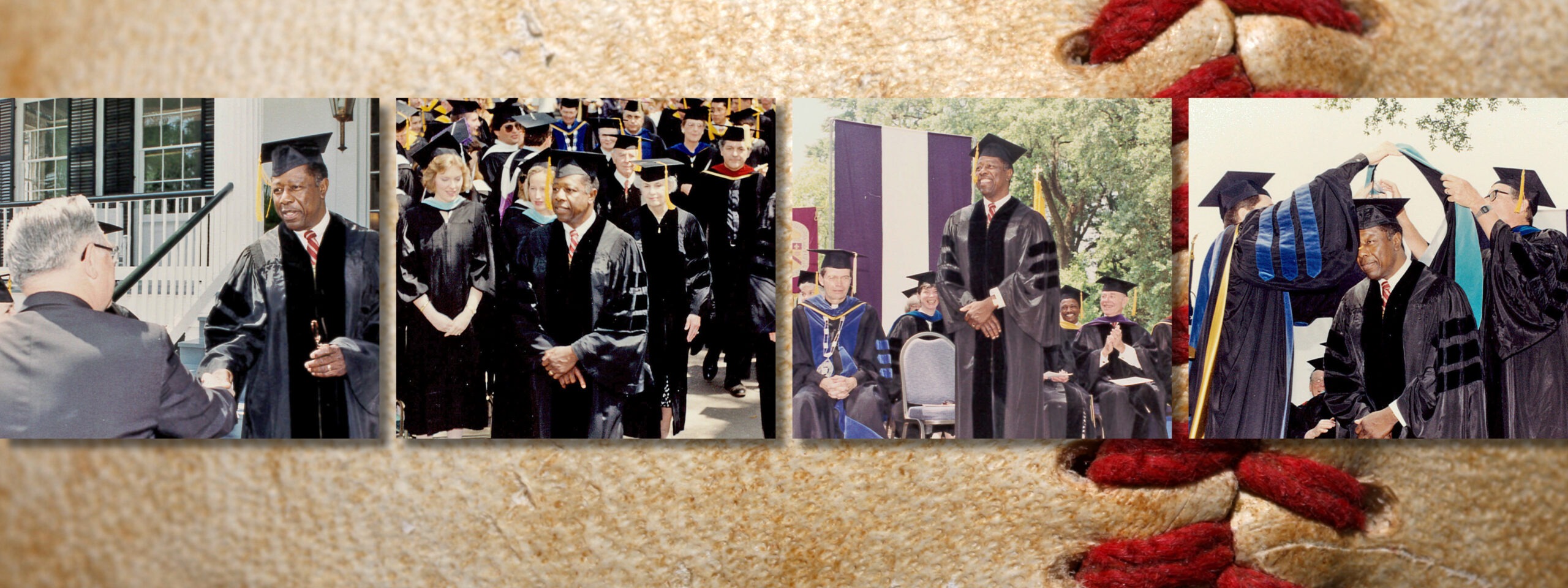
How the College Honored His Career, His Record, and His Commitment to Civil Rights
Henry Louis “Hank” Aaron, born February 5, 1934, in Mobile, Ala. always believed that a man’s ability to achieve is limited only by his lack of opportunity.
Spring Hill College joins the Mobile community and the rest of the world in mourning the passing of our “Hometown Hero.” As tributes pour in and memorials are set, his roots also run through the Hill.
While Aaron was honored for his accomplishments on the baseball field, his most enduring and rewarding legacy was off the field, in the area of civil rights. He was as much an ambassador for the game as he was for racial equality. He spent 13 years playing professional baseball before the Civil Rights Act of 1964 outlawed discrimination on the basis of race, color, religion, sex, or national origin. It would then be another year before the Voting Rights Act of 1965 — which prohibited racial discrimination in voting — was signed into law.
Aaron used his baseball career as a platform to champion civil rights. He encouraged more young Black athletes to stay in baseball and he became the first Black American to hold a senior management position in baseball as a front-office executive with the Atlanta Braves. He supported the National Association for the Advancement of Colored People (NAACP) and he founded the Chasing the Dream Foundation to support underprivileged youth with mentoring and financial support.
President George W. Bush awarded Aaron the Presidential Medal of Freedom for his civil rights-focused philanthropy and humanitarian endeavors in 2002. The Baseball Hall of Fame opened a permanent exhibit in 2009 chronicling Aaron’s life. But before all of the national accolades, we remembered him on the Hill.
Aaron’s first appearance on the Hill was on November 9, 1987, when the college’s Business and Management Division hosted a lecture series. At the time, Aaron was Vice President of Planning Development for the Atlanta Braves, the team from which he retired. He spoke in the area then known as the Badger’s Den on campus. His topic, “Affirmative Action in Major League Baseball Management.” At that time, baseball was struggling with the perception of racism in the hiring of managers and front office staff. For Aaron, it was an opportunity to translate his success on the baseball field into influence as a baseball executive.
On May 10, 1992, Aaron was awarded an honorary doctorate degree from Spring Hill College. During the commencement ceremony, his presenter, Dr. Robert McAleese, Professor of Psychology stated the following:
“Henry Aaron: Born and educated in Mobile, you began your distinguished career in Toulminville playing softball with your brothers and neighbors. Your strong family values were instilled in you by your supportive parents who encouraged your determination and hard work.
Your diligent passion for success has paved the way for hundreds of black players for nearly 40 years. You suffered humiliation, you were the target of threats, you were discriminated against both on and off the playing field, yet you persevered for yourself, your family, and future generations of minority players.
And while you rewrote the record book in baseball, you have made significant accomplishments in other areas as well: in your private life you have dedicated your energies to assisting traditionally black colleges and your work with the Boy Scouts of America has been nationally applauded.
For permanently etching a place for minority players on the field and in the front office, Spring Hill College bestows upon you the degree of DOCTOR OF PUBLIC SERVICE, honoris causa.”
Aaron dedicated his life to creating opportunities for all those who were not as fortunate as he. In 2003, he told former English Professor, Dr. John Hafner, as much in his own words:
“I can only thank God that I played the game well enough that maybe it meant something. Maybe, in the end, I can do as much good in my way, as say a Teacher. That’s what my Mama wanted me to be. With all of my wondering, I don’t doubt for a minute what baseball has done for me. Playing baseball has given me all that a man could ask for – certainly a lot more than a timid little black kid like me ever dared to dream about. I’ve traveled the world, met Presidents, had my share of fortune and more fame than I ever wanted. The fact is, I have every reason to be content. I don’t hear much about Babe Ruth anymore, thank goodness…” (from Dr. John Hafner’s “Literary Mobile”, published 2003).
We are grateful for the opportunity to share his light and legacy on The Hill.
Media Contact:
Office of Marketing & Communications
news@shc.edu
